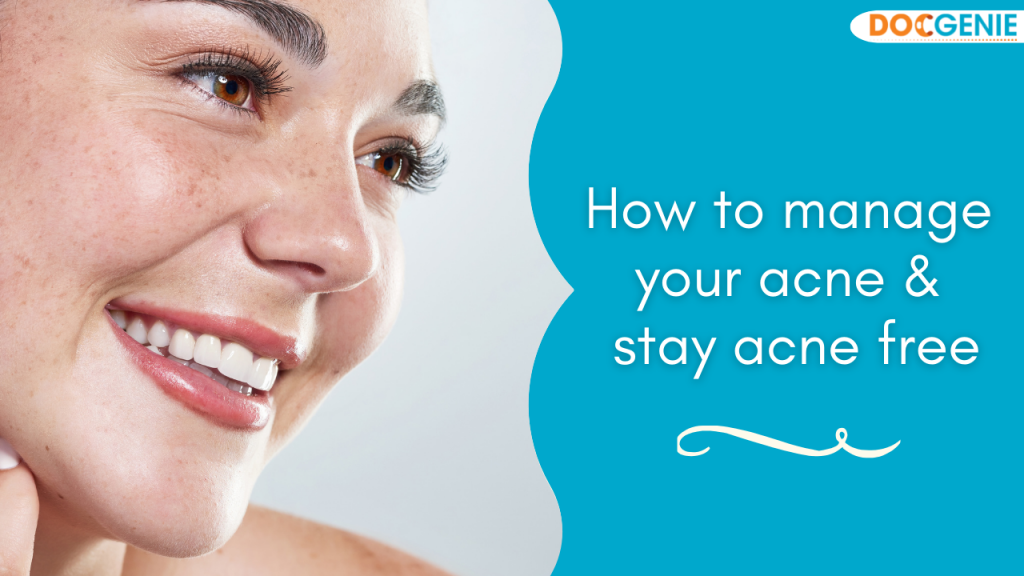
Acne is a common skin problem that mostly occurs in young adults between 12-18 years of age. Acne can be irksome as it manifests as blackheads, whiteheads, inflamed pimples and deeper lumps. This skin condition primarily affects the face, but occasionally can also affect the neck, back, shoulders, chest, and/or upper arms. Hormonal imbalance which leads to excess stimulation of sebaceous glands is one of the contributory causes of Acne.
Other contributing factors are-
- Genetics
- Food habits
- Excessive use of skin products
- Pollution
- Squeezing or picking at pimples
- High humidity
- Some medications
There are different types of medications to treat acne, but you can also take some steps to manage your acne.
Some steps to manage acne –
1. Avoid certain foods
Your diet can help manage acne. Skin issues are often exacerbated by processed foods, fast food, sodas and alcohol. Avoiding these foods may help you greatly in managing your breakouts.
However, before making any changes to your diet it is better to consult with doctor to ensure that you are having the required amount of calories and nutrients each day.
2. Wash your face well
Washing the face daily helps in removing the accumulated oil, dirt, and sweat. However, frequent washing or using skin products that dry out the skin may aggravate your acne. Think of washing your face twice daily with lukewarm water and sulphate-free, fragrance-free, gentle skin products. Knowing your skin type can help you understand which products to use. Usually those with oily skin type are more prone to acne. For them a moisturiser made for dry skin type may lead to clogged pores which can make the Acne worse.
3. Use a moisturiser
Using a moisturiser can help manage acne as it keeps the skin hydrated. Dry skin often produces oil to counterbalance the dryness. This oil can cause pimples. However, it is better to be careful while buying a moisturiser. Many of these products might have ingredients like oil and synthetic fragrance which can cause skin irritation and pimples. It is advisable to check the ingredient list before buying a moisturiser. For Acne-prone or sensitive skin types, it is better to choose products with fewer ingredients or consult with a dermatologist.
4. Over-the-counter medication
Over-the-counter (OTC) acne medication can also be helpful in healing and preventing breakouts. However, there are certain side effects, like, redness, irritation, and dryness associated with them. Hence, it is recommended to read the manufacturer’s usage instructions before taking the medications.
If you’re not sure which OTC acne medication is best for you, it may be worth consulting a dermatologist. If you are in Delhi see the best dermatologist in Delhi NCR for skin to get an expert opinion. An experienced skin specialist in Delhi can recommend the right products to use and advise you regarding the side effects of the products.
At times, OTC acne treatments do not work, in that case you might need to see your dermatologist for prescribed antibiotics to treat your acne. Antibiotic treatments are available as pills to eat and creams to apply.
5. Drink plenty of water
When your body is dehydrated, the oil glands of your skin tend to produce more oil. Moreover, dehydration can also cause dullness and redness of skin. Skin experts usually recommend drinking at least eight glasses of water daily.
Also read: 8 Easy and Effective Home Remedies to Treat Acne
6. Reduce sun exposure
Excessive and Recurrent sun exposure can dehydrate your skin and make it produce more oil which in turn blocks pores.
7. Avoid touching your face
Every time you touch your face, some bacteria and dirt may make their way into your skin. Try to stay alert and avoid touching your face. Wash your hands at regular intervals so that even if you end up touching your face your hands remain germ free.
Also be careful not to pop the pimples as it may lead to bleeding, scarring, or infection. Moreover, the popping may also lead to further inflammation and clogging of the adjoining pores, making the condition far worse.
8. Try tea tree oil
Tea tree essential oil is a natural remedy for acne. The compound called terpinen-4-ol, present in oil can kill certain bacteria, viruses, and fungi. Moreover, it can also increase white blood cells thus facilitating healing.
You can apply a couple of drops of the oil to the inflamed area or add the drops to your moisturiser. However, the undiluted oil might irritate your skin. In case it does, you can dilute the oil with water before use.
In addition to the above eight steps, limiting your use of make-up, and regular stress-busting activities like yoga, meditation, journaling, massage, aromatherapy and exercise may also contribute greatly in managing acne.
However, if the acne gets worse in spite of taking these steps it is better to see a dermatologist. If you are in Delhi, you can make an appointment with the best dermatologist in Delhi NCR for skin issues. You can also consider making an online appointment with a skin specialist in Delhi.
Also read: When You Should Seek Skin Care Help From A Dermatologist
DocGenie is an online telemedicine platform that provides you with quality healthcare from the comfort of your own space. On DocGenie, you can book an online consultation with highly qualified doctors as well as book lab tests for home collection.